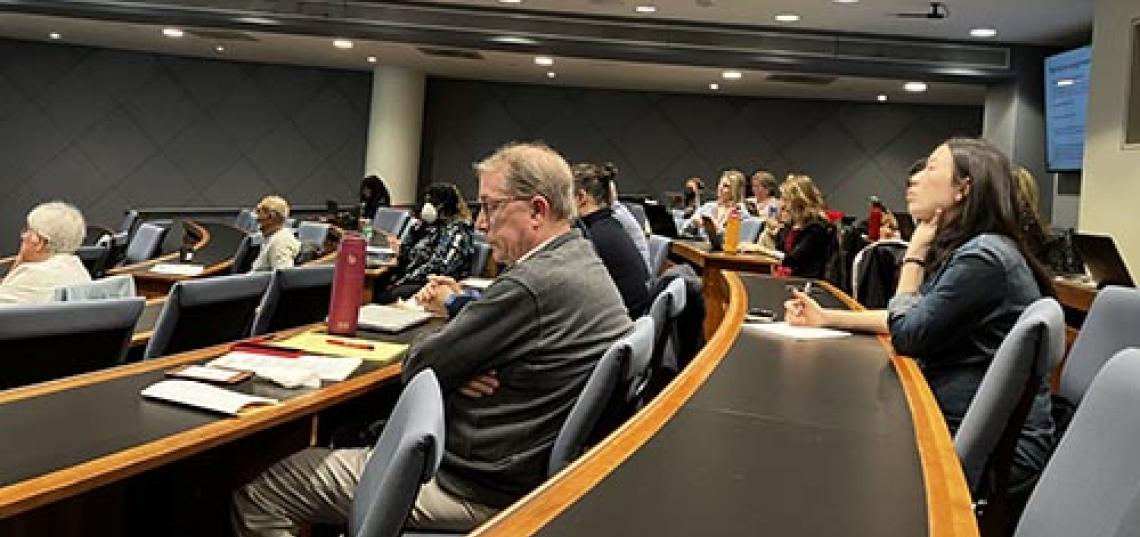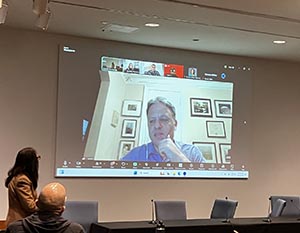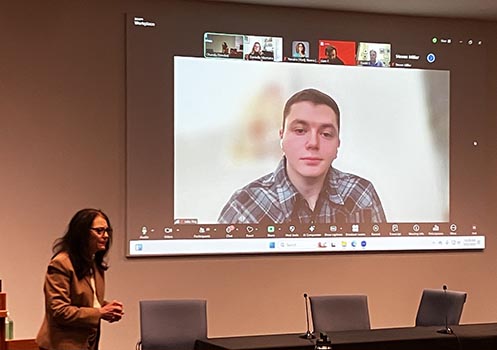
The third SC&I Teaching Incubator, “Teaching in the AI Era,” provided the SC&I community with the opportunity to explore and discuss issues such as Rutgers' orientation toward AI and teaching; how SC&I instructors are using AI in their courses; and how SC&I graduates are leveraging AI tools in their professional fields.
Held in person and virtually on March 12, 2025, the special event brought together more than 55 SC&I faculty members, instructors, and doctoral students. The incubator was initiated, planned, organized, and moderated by Assistant Dean for Programs Susan Keith. Assistant Dean for Programs and Assessment Sharon Stoerger provided her expertise to the event’s development and execution.
Following a welcome by SC&I Interim Dean Dafna Lemish, Keith kicked off the event with her presentation “Welcome to the Wild West: Contexts for a Discussion on AI and Teaching,” which opened the first panel and provided context for the event’s discussions.
 “AI is not an entirely new concept,” Keith said. “It has been with us for decades in various modalities. However, this moment is different. The latest generation of AI developed very quickly in 2022, when Rutgers was still reeling from Covid. Then in 2023 and 2024 we were hit with AI tools that seemed to multiply in their abilities and numbers. Since these new AI tools are probably not going back in the bottle, Rutgers faculty, in our instructional settings, are now in a ‘wild west moment,’ a time that is similar to when the internet and social media were introduced and instructors worried about how those new technologies would change classroom instruction and student learning. This incubator will help the SC&I community build pathways for future conversations.”
“AI is not an entirely new concept,” Keith said. “It has been with us for decades in various modalities. However, this moment is different. The latest generation of AI developed very quickly in 2022, when Rutgers was still reeling from Covid. Then in 2023 and 2024 we were hit with AI tools that seemed to multiply in their abilities and numbers. Since these new AI tools are probably not going back in the bottle, Rutgers faculty, in our instructional settings, are now in a ‘wild west moment,’ a time that is similar to when the internet and social media were introduced and instructors worried about how those new technologies would change classroom instruction and student learning. This incubator will help the SC&I community build pathways for future conversations.”
Also presenting on the first panel was Assistant Professor Britt Paris, who presented “AI & Labor Concerns in Higher Education: Causes, Symptoms, and Recommendations.”
On the second panel, “Facing AI Challenges,” presentations were made by Stoerger on “Academic Integrity and Reporting Process”; Professor Regina Marchi on “Documenting and Reporting Unauthorized AI Use”; and Ph.D. student Leah Cates presented “Why Use AI? Insight Into Students’ Perspectives and Positionalities.”
For “Designing AI- Resistant Assignments,” the third panel, SC&I instructors gave four presentations: “Brief Cases from the DCIM Course Digital Technology and Disruptive Change” by Ph.D. candidate Niki Natarajan; “Social Annotation: Scholarly Evidence Base, AI Robustness, and Configuration in Canvas” by LIS Chair and Associate Professor Rebecca Reynolds; “Beyond Copy Paste: AI-Assisted Writing Assignments,” by Associate Professor Katherine Ognyanova; and "Did I Hear You Say Oral Assessment?" by IT and Informatics Lecturer Silvia Mueller.
The fourth panel, “Incorporating AI into Courses” featured discussions on “Improving Literacy by Letting Students Grade AI-Generated Work,” by Assistant Professor Jianing Li; “From Text to Video: Using AI to Enhance Course Materials with Fliki,” by Associate Teaching Professor Gina Marcello; and “AIT and Informatics,” by Director of Undergraduate Studies in Information Technology and Informatics and Assistant Teaching Professor Warren Allen.
The final panel, “How SC&I Graduates are Using AI Beyond Rutgers,” presentations were given by:
- Liam Fleisher ITI’23, unit computing specialist, Rutgers University
- David Gaffen JMS’95, breaking news editor for companies news, Reuters
- Danielle Montana COM’16, senior vice president for PepperComm, an integrated communications and marketing firm
- Jake Roy ITI’22 data analyst, Children's Hospital of Philadelphia (CHOP)
Reflecting on the event, several members of the SC&I community shared their thoughts about its success and impact.
Describing the incubator as “stimulating and informative,” Lemish said, “There is so much to take away from this event, and so much to follow up on, but it is also so inspiring to see the depth and breadth of expertise that already exists in the school.”
Stoerger said, “The 'Teaching in the AI Era' Incubator provided a space for faculty and instructors to explore concerns and strategies for navigating the challenges of this rapidly evolving technology. We explored strategies for adapting to this evolving landscape through discussions on academic integrity, assignment design, AI literacy, and real-world applications. While this event served as an initial step, we recognize that the conversation is not over. Our goal is to continue engaging educators in meaningful discussions and collaborative efforts to thoughtfully integrate AI into our teaching and learning experiences.”
Explaining the invaluable insights provided by the SC&I graduates, Stoerger added, “We are often told that we must prepare students to use AI in the workplace, yet employers have not clearly defined which skills should take priority. The concluding panel of the Teaching Incubator was our attempt to bridge this gap by hearing directly from recent graduates about how AI is being used in their organizations. They shared insights on AI as a tool for idea generation while also highlighting its limitations. What stood out most was their unanimous emphasis on AI as a resource or a supportive tool and not as a replacement for human expertise.”
Paris said, “It was interesting to hear from colleagues about the extra effort they put in and work they do to accommodate — or ameliorate the harms of — the use of AI in educational contexts.”
Resources for SC&I faculty members and PhD students regarding AI and Teaching are available:
- AI and ChatGPT in Higher Ed
- AI Ideas for Course Activities, Assignments, and Design
- Rutgers AI Council, Teaching Critical AI Literacy Document
For further assistance in creating AI-robust assignments, SC&I faculty and instructors are welcome to contact the Instructional Design and Technology Services (IDTS) team: sci-idts@comminfo.rutgers.edu
Learn more about the Rutgers School of Communication and Information on the website.
